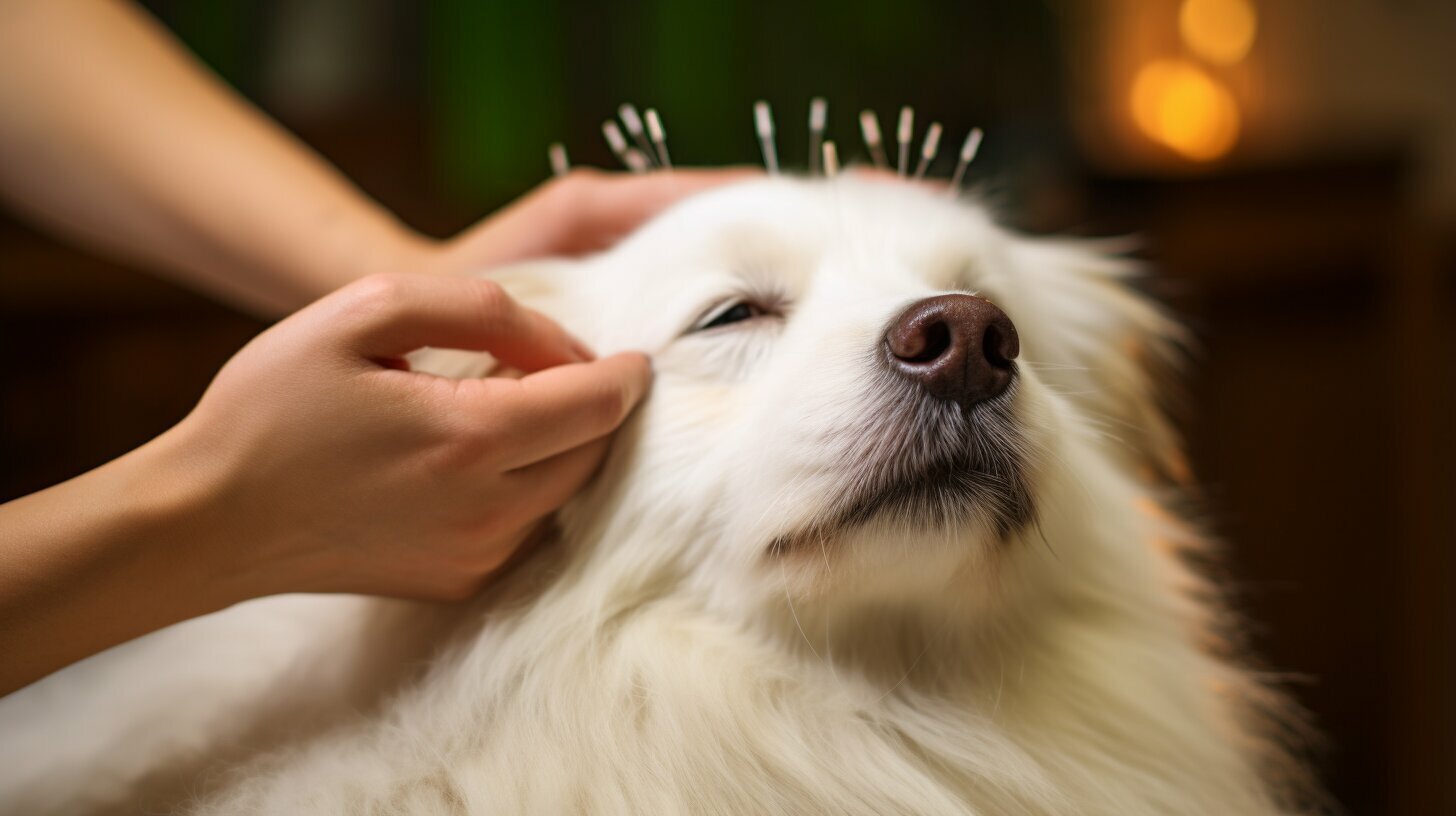
Acupuncture for pets is becoming increasingly popular as a holistic approach to pet care, offering numerous benefits for our furry friends. This ancient Chinese practice, which involves the insertion of thin needles into specific points on the body, has shown promising results in improving the overall wellness and vitality of pets.
As pet owners continue to seek alternative and natural therapies for their beloved companions, acupuncture has emerged as a safe and effective treatment option. Holistic pet care focuses on treating the whole animal, addressing not only the physical symptoms but also the underlying imbalances that may be causing them.
Animal acupuncture, much like its human counterpart, works by stimulating the body’s natural healing mechanisms. The placement of needles at specific points, known as acupuncture points or acupoints, helps to restore the flow of energy, or Qi, throughout the body. This improved energy flow promotes pain relief, relaxation of muscles, and enhanced blood circulation and oxygenation.
Various conditions in pets can benefit from acupuncture treatment. It has been particularly effective in alleviating arthritis, allergies, neurologic conditions, and gastrointestinal issues. By targeting these ailments at their root cause, acupuncture offers pets a chance for improved mobility, reduced discomfort, and enhanced overall well-being.
For optimal results, regular acupuncture sessions are recommended. Consistency in treatment allows for a cumulative effect, maximizing the benefits for our furry friends. Pet owners who incorporate acupuncture into their pet’s wellness routine often report noticeable improvements in their pet’s quality of life and a reduction in the need for conventional medications.
Key Takeaways:
- Acupuncture for pets is a growing trend in holistic pet care.
- It stimulates the body’s natural healing mechanisms and promotes overall wellness.
- Conditions such as arthritis, allergies, neurologic conditions, and gastrointestinal issues can be effectively treated with acupuncture.
- Regular acupuncture sessions are recommended for optimal results.
- This holistic approach can reduce reliance on conventional medications for pets.
Exploring the Benefits of Acupuncture for Pets
Discover the remarkable benefits of acupuncture for pets and how this ancient practice is transforming veterinary medicine for the better. Veterinary acupuncture is gaining popularity as a less invasive and potentially effective alternative treatment. It is a part of traditional Chinese medicine and is used to address various ailments in pets, including paralysis, limb weakness, epilepsy, pain, and urinary retention.
Acupuncture works by stimulating the release of pain-relieving and anti-inflammatory substances in the body, relaxing muscles, and improving blood flow and oxygenation. This can lead to immediate results and help improve the overall well-being of furry friends. The treatment is generally well-tolerated by animals, and many pet owners have witnessed the positive impact it has on their pets’ health.
One of the key advantages of acupuncture for pets is its versatility in treating a range of conditions. It can be particularly beneficial for pets suffering from arthritis, allergies, neurologic conditions, and gastrointestinal issues. By targeting specific points in the body, acupuncture can help alleviate pain, reduce inflammation, and improve the overall quality of life for pets.
While the number of acupuncture sessions required may vary depending on the condition and individual pet, regular sessions are often recommended for optimal results. Consistency in treatment is essential to maintain the benefits and promote the long-term well-being of pets. By incorporating acupuncture into their pet’s healthcare routine, pet owners can provide their furry friends with a holistic and natural approach to healing.
| Benefits of Acupuncture for Pets |
|---|
| Pain relief |
| Reduced inflammation |
| Improved blood flow and oxygenation |
| Relaxation of muscles |
| Treatment of arthritis, allergies, neurologic conditions, and gastrointestinal issues |
Understanding the Healing Power of Acupuncture for Pets
Dive into the fascinating world of acupuncture therapy for animals and explore how this natural healing modality is revolutionizing alternative medicine for pets. Acupuncture is not just limited to humans; it is increasingly being recognized as a valuable treatment option for our furry friends. This ancient practice, rooted in traditional Chinese medicine, holds tremendous potential for improving the well-being of pets.
Acupuncture works by stimulating specific points on the body, known as acupuncture points or acupoints, with thin, sterile needles. This stimulation triggers a cascade of physiological responses, including the release of pain-relieving and anti-inflammatory substances, relaxation of muscles, and improved blood flow and oxygenation. These effects promote healing and enhance the overall physical and emotional well-being of the animals undergoing treatment.
Acupuncture therapy for animals is a gentle, non-invasive approach that can complement conventional veterinary care. It not only addresses the symptoms but also targets the underlying imbalances in the body, promoting natural healing and restoring harmony.
One of the remarkable aspects of acupuncture is its well-tolerated nature by animals. They often show immediate responses to the treatment, with many experiencing pain relief, increased mobility, and improved energy levels. Moreover, acupuncture can be beneficial for a wide range of conditions in pets, including arthritis, allergies, neurologic conditions, and gastrointestinal issues. This makes it a versatile and holistic approach to their healthcare.
Unlock the Potential of Acupuncture for Your Beloved Pet
If you’re seeking alternative medicine options for your pet, acupuncture therapy may be worth considering. By consulting a qualified veterinarian who specializes in acupuncture, you can explore the potential benefits and determine whether it is a suitable treatment option for your furry companion. Remember, regular sessions may be required to achieve optimal results, as acupuncture works best when administered consistently.
Incorporating acupuncture into your pet’s healthcare routine can make a significant difference in their overall well-being. Discover the healing power of this ancient practice and give your beloved pet the gift of natural healing with acupuncture therapy.
| Conditions | Treated with Acupuncture |
|---|---|
| Arthritis | Yes |
| Allergies | Yes |
| Neurologic Conditions | Yes |
| Gastrointestinal Conditions | Yes |
Conditions Treated with Acupuncture in Pets
From arthritis to allergies, neurologic conditions, and gastrointestinal issues, acupuncture offers a wide range of effective treatment options for pets facing various health challenges. Pets, like humans, can experience a variety of health issues, and acupuncture has emerged as a holistic approach to addressing these conditions. By stimulating specific points on the body, acupuncture can help alleviate pain, reduce inflammation, and restore balance to the body, promoting overall well-being.
For pets suffering from arthritis, acupuncture can provide much-needed relief. This degenerative joint disease is common in older animals and can cause discomfort and limited mobility. By targeting the acupuncture points associated with joint health, acupuncture helps reduce inflammation and promote healing, allowing pets to move more comfortably.
Allergies, another common ailment in pets, can also be effectively treated with acupuncture. By strengthening the pet’s immune system and regulating the body’s response to allergens, acupuncture can alleviate symptoms such as itching, redness, and inflammation. It can also help reduce the reliance on medication, providing a more holistic and natural approach to managing allergies.
Neurologic and gastrointestinal conditions can also benefit from acupuncture treatment. In neurologic conditions like paralysis or limb weakness, acupuncture helps stimulate nerves and improve blood flow to affected areas, potentially restoring function and mobility. Gastrointestinal conditions such as vomiting, diarrhea, or constipation can be treated by targeting specific acupuncture points that regulate digestion and promote a healthy gut.
When considering acupuncture as a treatment option for your pet, it’s important to consult with a qualified veterinarian trained in veterinary acupuncture. They will be able to assess your pet’s condition and determine the most appropriate treatment plan. In some cases, regular sessions may be required to achieve optimal results. With its proven effectiveness and minimal side effects, acupuncture for pets offers a holistic and non-invasive approach to improving their overall wellness and quality of life.
Optimal Acupuncture Treatment for Pets
Explore the key factors for an optimal acupuncture treatment plan for pets, including the importance of regular sessions and the role they play in achieving long-lasting results.
When it comes to acupuncture therapy for animals, consistency is key. Regular sessions are essential to ensure optimal results and maintain your pet’s overall well-being. Acupuncture for pets is gaining popularity as a less invasive and potentially effective alternative treatment. It has been used in traditional Chinese medicine for centuries to treat various ailments, including paralysis, limb weakness, epilepsy, pain, and urinary retention.
Acupuncture works by stimulating the release of pain-relieving and anti-inflammatory substances in your pet’s body. This not only helps to alleviate their discomfort but also promotes relaxation of muscles and improves blood flow and oxygenation. Animals often show immediate results after an acupuncture session, and the treatment is generally well-tolerated.
Depending on your pet’s condition, multiple sessions may be necessary. Acupuncture can effectively treat a range of ailments in pets, including arthritis, allergies, neurologic conditions, and gastrointestinal conditions. Regular sessions allow for ongoing support and maintenance of your pet’s health.
By committing to regular acupuncture sessions, you are providing your furry friend with the best chance of achieving optimal results. The holistic nature of acupuncture therapy promotes balance and harmony within your pet’s body, leading to improved overall wellness and vitality. So, schedule those regular sessions and embrace the healing power of acupuncture for your beloved pet.
FAQ
What is acupuncture for pets?
Acupuncture for pets is a holistic treatment approach that involves the insertion of thin needles into specific points on a pet’s body to alleviate various ailments and improve their overall wellness.
Is acupuncture a common practice for pets?
Acupuncture is gaining popularity as a less invasive and potentially effective alternative treatment for pets. While not as widely known or practiced as traditional veterinary medicine, it is becoming increasingly recognized and utilized.
What conditions can be treated with acupuncture in pets?
Acupuncture can be used to treat a range of conditions in pets, including arthritis, allergies, neurologic conditions, and gastrointestinal issues. It can also help with paralysis, limb weakness, epilepsy, pain, and urinary retention.
How does acupuncture work for pets?
Acupuncture stimulates the release of pain-relieving and anti-inflammatory substances in a pet’s body. It also relaxes muscles, improves blood flow, and enhances oxygenation, promoting overall healing and well-being.
Are acupuncture treatments well-tolerated by animals?
Yes, acupuncture treatments are generally well-tolerated by animals. Pets often show immediate results and experience minimal discomfort during the procedure. Many pets even find the treatment relaxing.
How many acupuncture sessions are required for optimal results?
The number of acupuncture sessions required for optimal results can vary depending on the pet’s condition and response to treatment. Regular sessions are often recommended to maintain the pet’s well-being and achieve long-lasting benefits.



